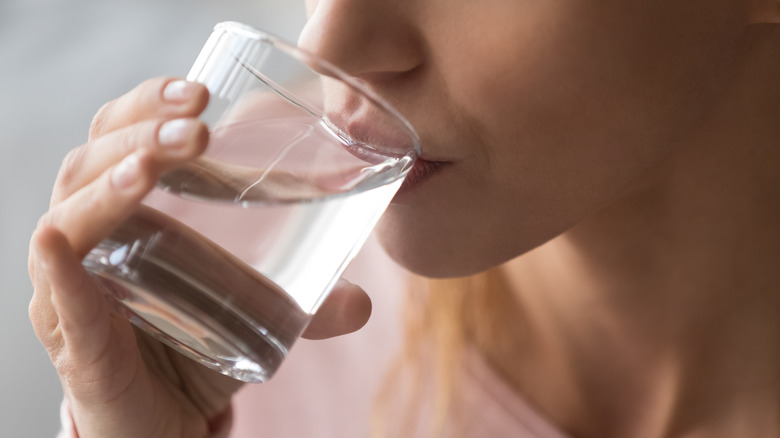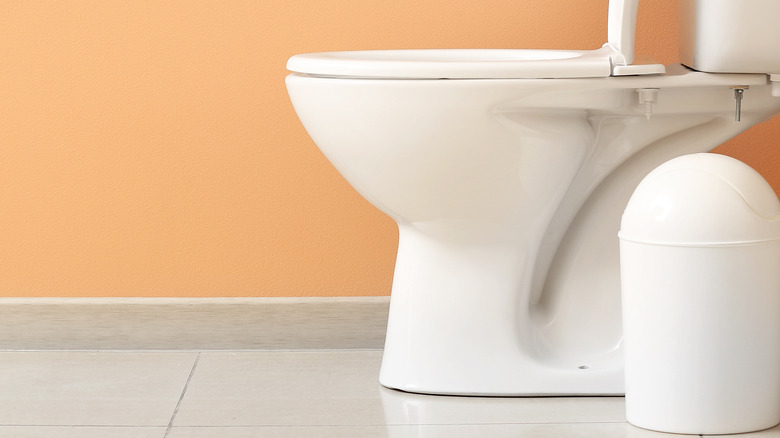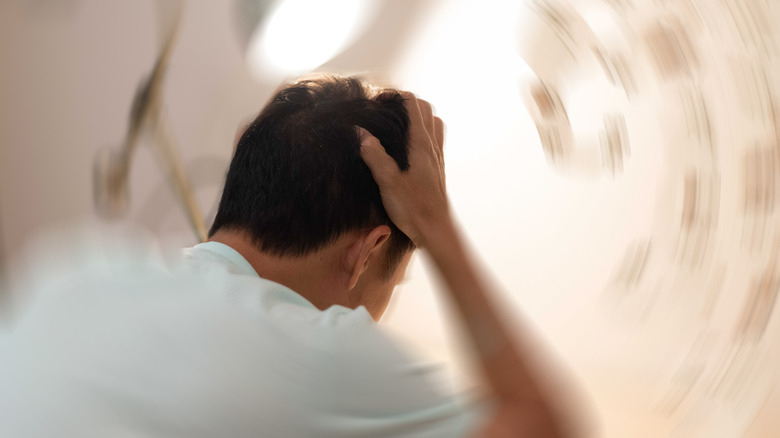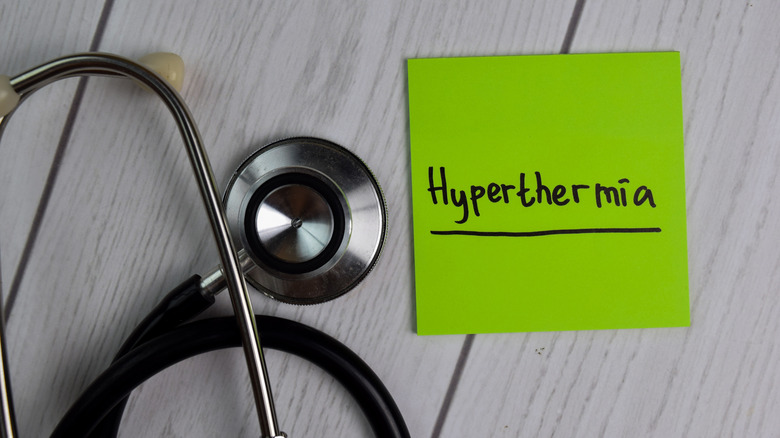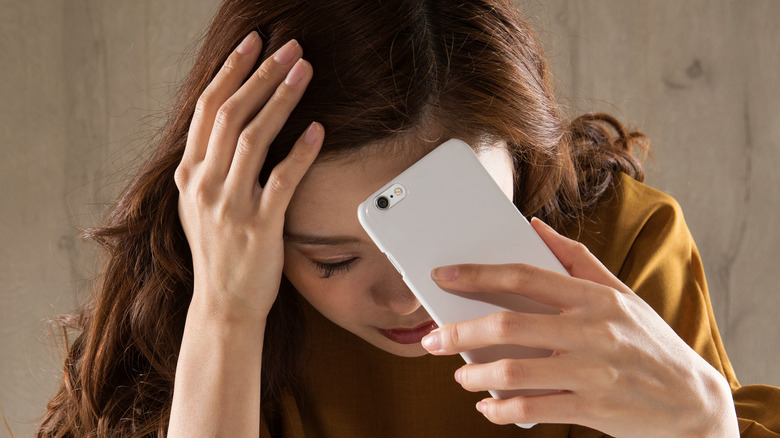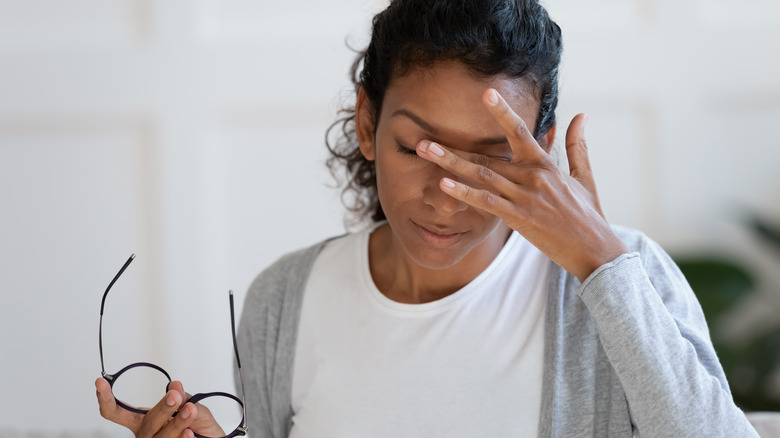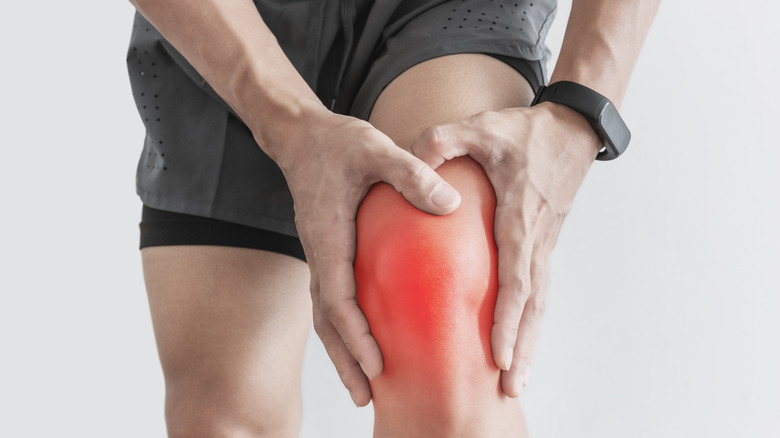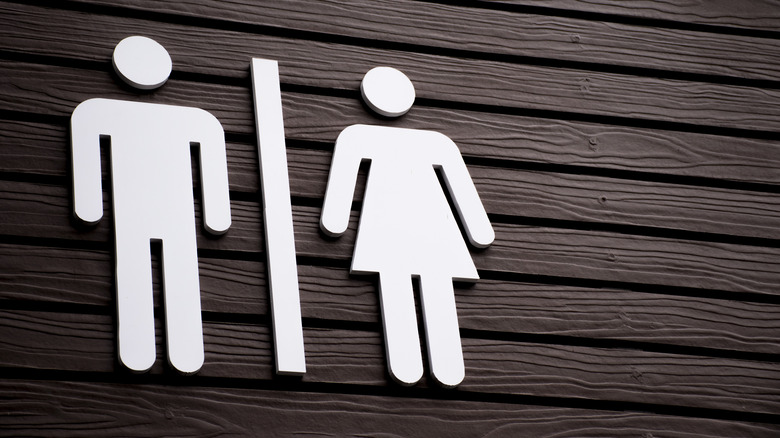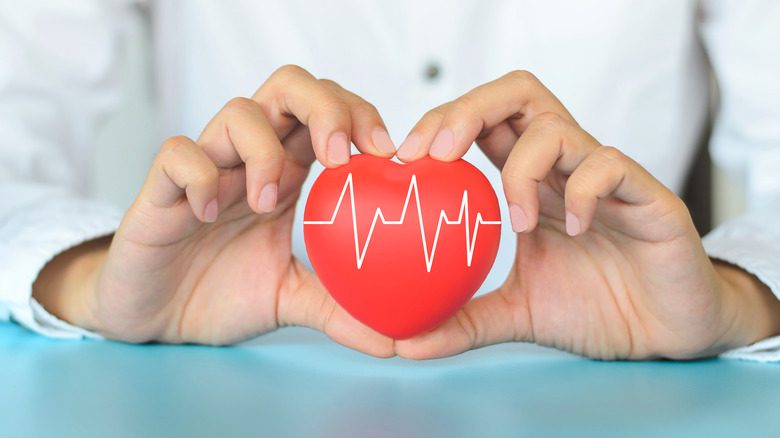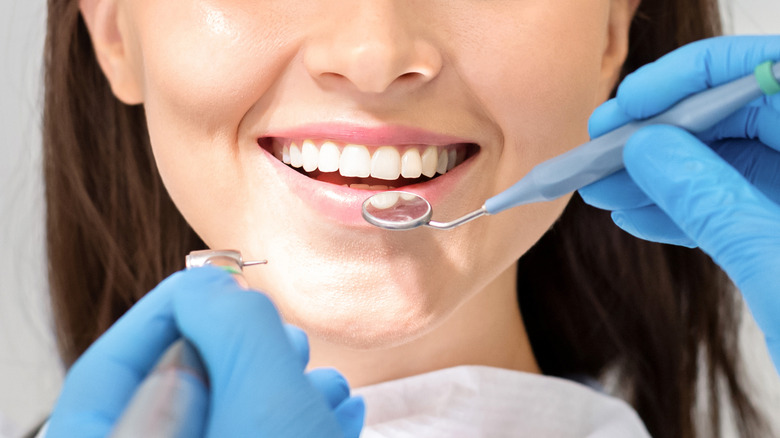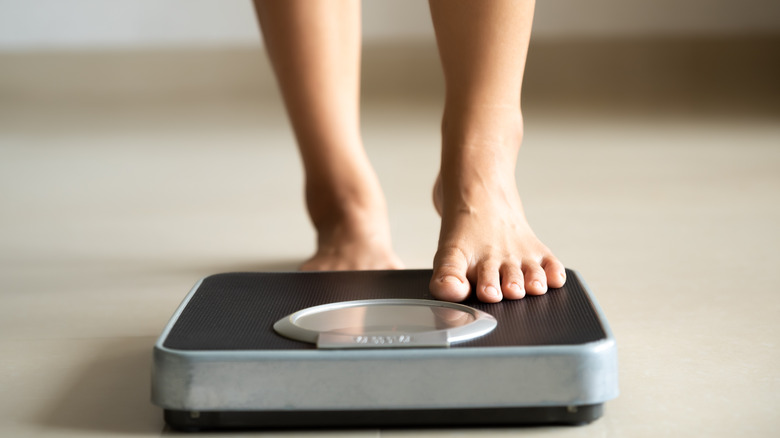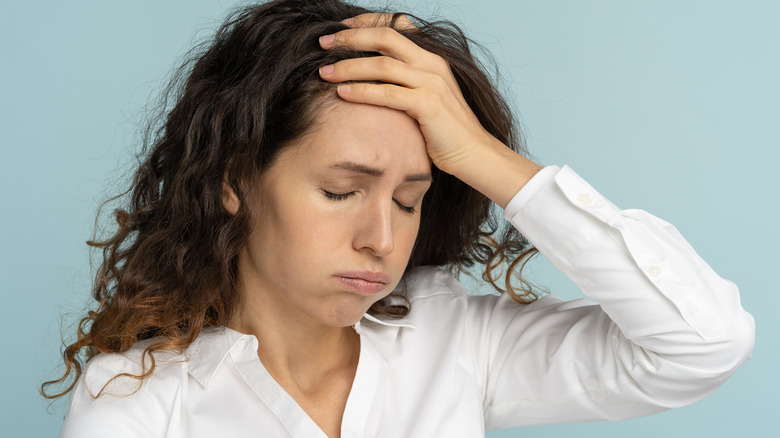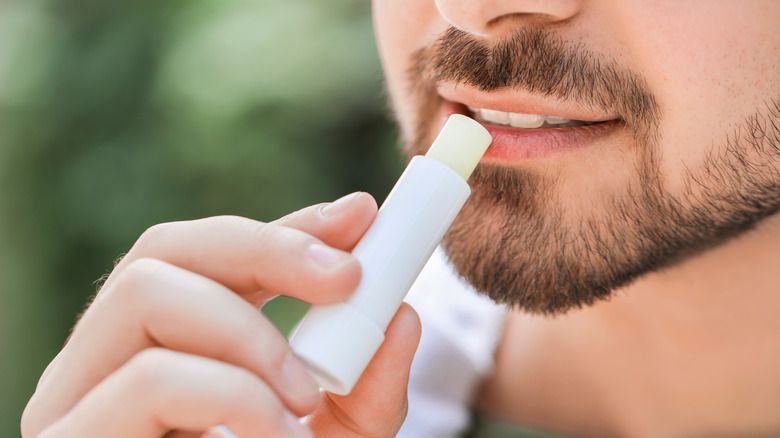Warning Signs Of Dehydration You Should Never Ignore
Let's try a little guessing game. As Medical News Today notes, a person can be mildly, moderately, or severely dehydrated. Now, keeping in mind that the human body is mostly water, how much water do you need to lose to be considered severely dehydrated? Fifty percent? Twenty-five percent? Actually, according to the journal Emergency Nurse, losing just 10 to 15% of the total water in your body is enough to experience this potentially life-threatening form of dehydration. Yes, you read that right. Dehydration can be fatal.
According to Medical News Today, diarrhea is not only one of the more frequent causes of dehydration, but also of dehydration-related fatalities. Diarrhea is just one of the medical conditions that can cause dehydration, though. For example, whenever your body is releasing more fluids than normal (such as when you vomit), you run the risk of becoming dehydrated. Additionally, the glucose spikes that can happen to someone with diabetes can sometimes increase how often someone needs to urinate. In short, recognizing possible symptoms of dehydration is very important — and so is staying properly hydrated. However, as Go Health Urgent Care cautions, drinking too much water when you're severely dehydrated can cause hyponatremia. According to the Mayo Clinic, if this happens, the sodium in your blood can drop to potentially life-threatening levels.
So, if you suspect someone is severely (or even moderately) dehydrated, don't hesitate to call for medical help. Here are some warning signs of dehydration you should never ignore.
Dark-colored urine
Okay, we're going to get a little personal with this particular sign of dehydration. As Healthline explains, if your urine is either similar to the color of honey or amber, then you might be dehydrated. However, changes in your urine's color can occur for other reasons besides your body's fluids being lower than normal.
For example, urine that looks more like syrup is more likely to be a red flag of problems with your kidneys and/or liver. Dehydration is also less likely to be culprit behind dark urine that has red or brown in it. And of course, what you eat and the medications you take can change your urine's appearance regardless of how much water you drink. With all that said, there's a simple way to test if your urine's darker appearance is due to your body needing more hydration.
If your urine's color lightens after you start drinking more water, then in all likelihood, dehydration was the cause. But dark urine can be a sign of a number of medical conditions, so if you're not sure if dehydration was the reason for your urine's change in color, contact your health care professional. Remember, even though bathroom-related subjects can be embarrassing to talk about, it's better to be safe than sorry. And don't forget to bring a list of foods you've eaten recently, especially if those include berries, fava beans, beets, or rhubarb.
Feeling dizzy
In the second "Pirates of the Caribbean" movie, Will Turner (Orlando Bloom) and James Norrington (Jack Davenport) swordfight on top and inside of a giant rolling wheel. When the wheel finally comes to a stop, the two men emerge staggering and barely able to stay on their feet. The scene is funny in part because we've all felt dizzy on certain occasions. But if you're experiencing dizziness for no apparent reason, your body might be trying to tell you that you're dehydrated.
As Healthline explains, common symptoms of dizziness like having difficulty maintaining your balance and feeling lightheaded could be because your body's fluids are too low. Other typical traits of dizziness include feeling like you're swimming or floating. And, yes, even though it's common in movies for someone who's dizzy to throw up, dizziness can really make you feel nauseous and cause vomiting. In addition, you can faint from being dizzy, whether or not dehydration is the root cause.
Yes, feeling dizzy can be a symptom of more than just being dehydrated. Dizzy spells can also occur because of issues with the inner ear and migraines. And while it isn't common, feeling dizzy is sometimes a red flag of more serious health problems like a brain disorder, a malignant tumor, or a stroke. So, if you're dizzy — especially if you're also experiencing nausea, vomiting, and lightheadedness to the point that you're fainting — you should call 911.
Hyperthermia
It's understandable to confuse a fever for hyperthermia. After all, both involve your body temperature rising. However, as the Cleveland Clinic explains, the reason why your temperature goes up and how these ailments are connected to dehydration are not the same.
If you're running a fever, then your body is turning up the heat to fight off outside invaders like dangerous bacteria and viruses. However, with hyperthermia, there are no invaders. Instead, imagine that your body is like a room with a space heater. If you close the door to that room, it will get very hot, because the heat from the heater becomes trapped inside. This is basically what happens if you have hyperthermia. Heat becomes trapped inside your body, causing your temperature to rise. And while fever can raise your chances of your fluid levels becoming low, dehydration can increase the odds of developing hyperthermia.
Fortunately, a few simple precautions can greatly reduce your chances of experiencing hyperthermia. One of the most common reasons someone might develop this ailment is a combination of three things: heat, humidity, and physical activity. For example, if you go running on a muggy day, you could experience hyperthermia, especially if you're not used to running and/or don't properly pace yourself. And your chances only increase if you don't stay hydrated. Additionally, dark-colored clothing that fits tightly can be contributing factors to hyperthermia.
Anxiety
Everyone experiences fear or anxiousness from time to time, but can being dehydrated really impact your mood? Well, to be fair, the scientific community is still exploring the connection between anxiety and dehydration. But according to Healthline, multiple studies' findings support that not staying hydrated can increase your chances of experiencing anxiety.
For example, a study in the World Journal of Psychiatry found that adults who didn't take in enough water were more likely to experience anxiety and depression. Based on a 2011 study published in the British Journal of Nutrition and a 2015 paper in Appetite, both men and women who consumed less water were more likely to experience tension. In addition, research published in PLoS One found that high water consumption and lower levels of tension appear to be connected. And as Healthline notes, research has found that your level of hydration can impact you mentally. For example, you might be more likely to experience fatigue or depression depending on how much water you drink.
Besides these findings, there's another possible reason why dehydration can impact your mood. A study in the journal Sleep found getting less shuteye and needing hydration can go hand in hand. And as anyone who's had a bad night's sleep will tell you, not getting enough rest can have a negative effect on your emotional state.
Trouble sleeping
There are many possible reasons why someone might have trouble sleeping or maintaining a healthy sleep pattern. Unfortunately, less sleep and dehydration are not only connected, but can also cause an unhealthy cycle, according to the Sleep Foundation. But to fully understand how, we need to talk about insensible water loss.
According to an article in the journal Advances in Physiology Education, insensible water loss can occur in a couple of different ways: sweating and breathing. And as the Sleep Foundation notes, how you breath while you sleep can impact how much water you lose during the night. In other words, are you a nose breather or a mouth breather? Of course, your body is designed to compensate for insensible water loss that happens while you're getting some shuteye (per Nature Neuroscience). However, disruptions in your sleep pattern can throw your body off, which can increase your chances of becoming dehydrated. And since your body needs water to properly function, being dehydrated can make it more likely that you'll have difficulty getting a healthy night's sleep.
In other words, dehydration can cause sleeping issues, which in turn can make you more dehydrated, and the pattern can escalate from there, according to the Sleep Foundation. However, not drinking water throughout the day and then chugging a great deal of it right before bed is not a great idea for staying hydrated. In fact, it's more likely to disrupt your sleep because you'll need to use the bathroom more frequently.
Eye issues
We often associate tears with crying, but as the North Georgia Eye Clinic explains, tears are more than just an emotional release. Being able to make tears helps keep our eyes clean, lubricated, and free of infection. But like when there's an emergency on "Star Trek" and all power is diverted to life support, our bodies begin redirecting our fluids when we're dehydrated. And unfortunately, our bodies don't consider our eyes crucial "life support" if our fluids are low.
Dehydration can lead to our eyes not being able to produce normal amounts of tears. This can cause a condition known as dry eye. Don't worry, this doesn't mean that your eyes would become as dry as a desert. In fact, despite its name, someone with dry eyes can experience watery eyes, as well as blurry vision and eye irritation. In addition, if your eyes don't have enough tears, they might not be lubricated well enough. If this happens, you might experience eye strain, an eye health condition that can cause issues like double vision and headaches.
If you suspect that dehydration is the cause behind your eye problems, the North Georgia Eye Clinic recommends hydrating yourself. In addition, closing your eyes can help relieve eye strain. Eye drops can also be helpful for dry eye. However, there are quite a few brands on the market, so you might want to speak with your eye doctor or a health care professional before trying one.
Joint pain
In "The Wizard of Oz," the Tin Man needed his friends to oil his joints, or he would have difficulty moving. But did you know that we humans need to keep our joints lubricated as well? According to Orthopedic Associates' website, there's thick fluid between our joints that not only supplies nutrients to them, but also prevents our bones from making contact when they move. In addition, this fluid protects our cartilage by dampening friction.
In other words, this fluid is our joints' natural lubrication. And if you guessed that dehydration reduces the amount of this fluid in your joints, then you're absolutely right. Plus, the cartilage in your joints is rough 70% to 80% water. Now, in all fairness, it's more likely that dehydration is only adding to an already existing case of joint pain. In other words, the main reason your joints are hurting is probably because of another health issue like arthritis, a sprain, bursitis, or even an infection.
So, while dehydration is unlikely to be the main source of joint pain in areas like your hands, feet, hips, shoulders, and knees, it can be a contributing factor. This mean that increasing your water intake isn't going to make your joints feel like new. However, staying properly hydrated might reduce your joint pain, which means it should be part of your joint-friendly lifestyle and treatment plan.
Low urine output
Being dehydrated can affect your urine's color, per Healthline. But that's not the only bathroom-related issue that can happen as a result of your body needing more fluids. According to Medical News Today, dehydration often leads to a condition called oliguria, wherein your body releases less urine than it normally would.
To fully understand dehydration's connection to low urine output, we need to delve into some of the reasons why a person might become dehydrated. For starters, diarrhea can cause dehydration. So can other medical issues like vomiting and running a fever. When your body loses more water than it's taking in, your kidneys might attempt to help keep your water reserves from dipping any lower by not sending as much urine (or not sending any at all) into your bladder.
If you notice that your urine output is lower than normal and you think dehydration might be the cause, Healthline recommends slowly increasing your water intake. Electrolyte beverages, fruits, and even soups can help rehydrate your body. In fact, your health care professional might have an electrolyte drink formulated to not only help restore your body's fluids but also its salt levels. But remember, dehydration is not the only reason why someone might have oliguria. It can also be a sign of kidney failure, infections, or a negative reaction to certain medications. Thus, if you aren't sure if dehydration is causing your low urine output, seek medical assistance.
Changes in heart rate
Take a moment and picture a gallon of milk, like the ones you see at a supermarket. Imagine the size of that gallon and its weight when you lift it. Now, imagine 2,000 of those gallons. That's roughly how much blood your heart pumps throughout your body on a daily basis, according to the University of Pittsburgh Medical Center.
To say your heart is an incredibly hardworking muscle is an understatement. So, it's not surprising that dehydration can have a negative effect on your heart. Less fluid in your body means your blood volume goes down, and your heart might react to this by speeding up. However, less fluid also means higher amounts of sodium can wind up in your heart, which can interfere with it properly pumping blood. And as you can imagine, exercising — especially forms that are meant to increase your heart rate — can further exacerbate this situation.
Fortunately, there's a simple way to monitor your hydration level when you exercise, according to Dr. John Batson, a sports medicine physician (per the American Heart Association). First, weigh yourself prior to beginning your workout. Then weigh yourself again when you're done with your exercise routine to figure out how much water you lost through sweating. "For every pound of sweat you lose, that's a pint of water you'll need to replenish," Batson said.
Craving sweets
Sometimes, your body lets you know you're dehydrated in ways that you might not associate with needing water. For example, you might start reaching for sugary candy instead of a bottle of water. But as Dr. John Higgins, a professor of medicine at the University of Texas in Houston, told Everyday Health, there's a logical physical reason for this seemingly strange reaction to dehydration.
"When you're dehydrated, it can be difficult for organs such as the liver, which uses water, to release glycogen [stored glucose] and other components of your energy stores, so you can actually get cravings for food," he explained. Remember, if your body has trouble properly breaking down glycogen, then it's harder for it to circulate glucose throughout your body via your blood. This can lead to your body trying to increase its sugar intake to compensate instead of trying to hydrate.
Unfortunately, an activity you should do regularly — exercise — can complicate this situation further. As registered dietitian Amy Goodson, the sports dietitian for the Dallas Cowboys, told CNN, "When you exercise in a dehydrated state, you use glycogen (stored carbohydrate) at a faster rate, thus diminishing your stores more quickly." In other words, not keeping yourself hydrated during a workout can force your body to use more glycogen than normal when it's already struggling to process it, which can rev up your sweet tooth. So, whether or not you work out often, staying properly hydrated is crucial.
Changes to your oral health
Being thirsty is one of the most obvious signs that your body needs fluids. However, that's only the tip of iceberg when it comes to how dehydration can impact your oral health. As The Gorman Center for Fine Dentistry explains on its website, a huge red flag of dehydration is dry mouth, a condition that can come with a number of health concerns.
According to the American Dental Association, a person with dry mouth produces less saliva. This means the person has fewer natural defenses against bacteria, and may even have trouble keeping the tissues of their mouth strong and healthy. And as The Gorman Center for Fine Dentistry points out, this can lead to dental problems like cavities. Your teeth might also become less white if you don't have as much saliva to wash away particles from what you eat and drink. Other dry mouth-related problems can range from halitosis (a.k.a. bad breath) to periodontal disease (where plaque and bacteria can accumulate in your gums).
However, there is some good news. One of the first symptoms of dehydration can be having dry mouth, meaning drinking more water could improve both health concerns. The Center also recommends coconut water as a good source of electrolytes and foods like applesauce and salads to help you stay hydrated.
Weight gain
Fair warning, this next symptom of dehydration is not going to seem to make sense. According to WebMD, when a person is dehydrated, they can gain weight because they're experiencing water weight. Yes, you read that right. Bloating can be a symptom of dehydration.
The reason why a person might have more water weight when they're dehydrated is because of how our bodies compensate when our fluids, chemicals, etc. are out of balance. The human body goes into "hoarding mode" when it detects that it's low on water. This means that it retains more water than normal, which is the reason why bloating and water weight can occur. And as registered dietitian Katherine Zeratsky told WebMD, the kidneys are especially involved in the amount of water you retain and release. "If you've had too much salt the night before, then your kidneys will hold on to more water to dilute or correct that salty imbalance," she said.
So, what should you do if you're experiencing water weight from dehydration? Well, if you hydrate yourself, then your kidneys should sense that your water levels are returning to normal and flush out the additional fluids. In other words, sometimes, the way to get rid of bloating is to drink more water. Of course, it's possible that hormones or kidney-related health issues are the real culprit, so don't hesitate to contact a health care professional if you don't think dehydration is reason behind your bloating.
Headaches
While there aren't a lot of studies concluding that dehydration can cause headaches, that doesn't mean there isn't a connection between your fluids dipping too low and your head hurting, according to Healthline. For example, hangover headaches are a recognized medical issue, and part of the reason why someone gets a hangover is they're dehydrated. In fact, even if you don't drink, a dehydration-related headache can feel very similar to a hangover headache.
A headache caused by dehydration usually feels like a pulsing pain, which is also how people often describe a headache from a hangover. Also, dehydration headaches tend to be on both the right and the left side of the head. In addition, a headache caused by lack of hydration tends to become worse if you engage in physical activity. Obviously, this can include exercise. However, the journal Headache published a study which found that small movements like bending down or moving one's head could also worsen a headache caused by dehydration.
Keep in mind that it is possible to have a headache because your fluids are too low, but without these exact symptoms, according to Healthline. Additionally, migraines, which usually cause pain on only one side of the head and tend to have non-pain related symptoms like seeing auras and feeling nauseous, can also be triggered by dehydration. Thus, the next time your head starts to hurt, you might want to try drinking some water or applying an ice pack.
Chapped lips and dehydrated skin
Let's clear up one common misconception. Dry skin and dehydrated skin are not the same thing, according to Medical News Today. Yes, they can cause similar symptoms, especially when it comes to the appearance of one's skin. However, dry skin occurs when your skin doesn't have the natural oils it needs to keep itself healthy. This could be due to a skin condition or washing habits.
Dehydrated skin, on the other hand, happens not because your skin doesn't have enough natural oils, but because your body is dehydrated. In fact, dehydrated skin sometimes causes skin patches that can be itchy or scaly. But that's not all. Losing more water than you're taking in can also make your complexion duller and your skin less stretchy and flexible. You might even notice more fine lines in your skin if you're experiencing dehydration.
And let's not forget about the skin on your lips. As Healthline explains, dehydration can make your lips scaly, swollen, dry, and flaky. And if that doesn't already sound unpleasant enough, being dehydrated can lead to cracked and bleeding lips, as well as sores forming on them.Using a hydrating lip balm could temporarily help, but if dehydration is the root cause behind your lip problems, then you really should hydrate properly — not just for your lips, but for your overall health as well.

